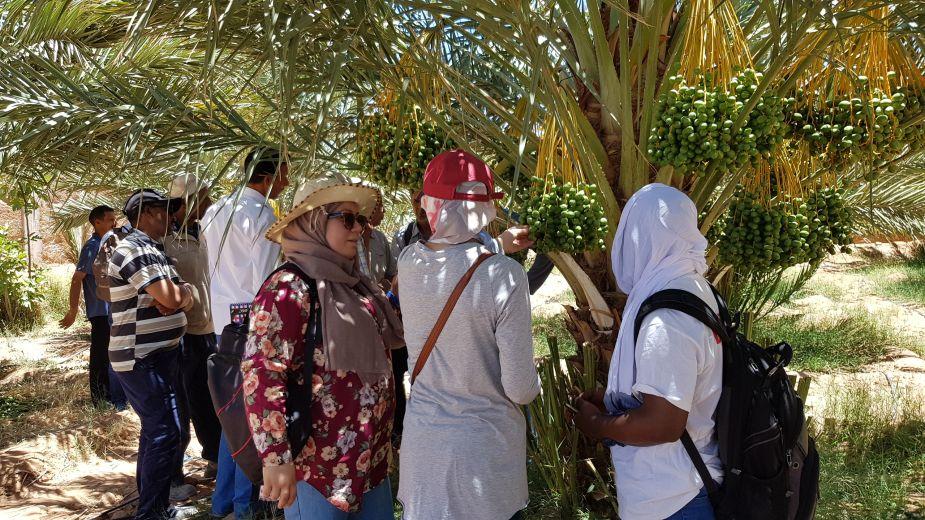Application of organic bio-fertilizer technology to improve the sustainability of date palm production and cultivation

The use of mineral fertilizers, pesticides and irrigation have a strong impact on livelihoods and the environment. The project aims to develop a novel organic bio-fertilizer technology which will contribute to a more sustainable and resilient agriculture.
About the project
Background
Date palm is an important crop in Morocco, Tunisia, and in many other drylands of the world with a high agricultural, economic and cultural value. The harsh environmental conditions of those areas, which are further accelerated by climate change and the spread of root diseases, are threatening date palm propagation and cultivation. As a consequence, two thirds of all date palms were destroyed in Morocco during the last decades, causing substantial economic and ecological damages. To overcome the growth limitations, current date palm production and cultivation regularly involves high inputs of mineral fertilizers, pesticides and irrigation. However, these high external inputs strongly impact the environment and livelihoods, are cost intensive, not resilient and thus not sustainable.
Objectives
The project aims at establishing a novel organic bio-fertilizer technology, combining the application of native beneficial soil microorganisms during tissue culture and field propagation of date palms, together with adapted agricultural management practices using organic amendments and intercropping with leguminous nitrogen-fixing crops. As bio-fertilizers, arbuscular mycorrhizal fungi (AMF) and plant growth-promoting rhizobacteria (PGPR) are in focus. A culture collection of native AMF and PGPR, isolated from date palm roots and rhizosphere, will be established, and strains selected for date palm growth promotion, nutrient acquisition and pathogen suppression will subsequently be used as bio-fertilizers. Customized propagation and application techniques of bio-fertilizers will be elaborated such as modern in-vitro methods suitable for tissue culture laboratories and low-tech, knowledge-rich approaches for smallholder farmers. The technology, integrating the use of organic amendments and leguminous intercrops, will be developed in a participatory approach, working at laboratory, on-station and on-farm scale. As part of an innovation platform, aims and problems of date palm producers (tissue culture laboratories, smallholder farmers and farmers’ organisations) will be targeted in order to align them with the research process. Gained knowledge on technical and methodological innovations will be disseminated to a broader circle of stakeholders including regional and national agricultural agencies in order to influence their operational procedures.
Relevance
The proposed organic bio-fertilizer technology will contribute to more sustainable, resilient agriculture, safeguarding natural resources. It will help to maintain and increase date palm production, and to counteract the on-going land degradation and desertification of dryland soils. Thus, rural livelihoods will be improved, and poverty-driven migration to urban centres will decrease. It is anticipated that the knowledge gained in this project in Morocco and Tunisia can be transferred to other areas where date palm represents a major crop.
Highlights and most important results
- Establishment of a culture collection of native biofertilizer strains composed of 34 PGPR, 24 AMF and twelve bacterial endophyte isolates.
- Improvement of the growth substrate at the acclimation stage which involves a partial replacement of peat by compost or biochar and inoculation with AMF decreased the mortality of vitro plants.
- The combined application of biofertilizers and compost at the hardening stage effective-ly accelerated the growth and improved the nutrition of date palms which enables the farmer to shorten the growth period in the nursery. In addition, stronger plants can bet-ter establish in the field after transplantation and are less prone to biotic and abiotic stresses.
- Our field experiments revealed the potential of OBF to improve yields and fruit quality, both of great economic importance for the farmers. In addition, OBF proved to be val-uable measures to improve date palm nutrition, affecting positively t plant health and tolerance against abiotic and biotic stresses. This will help the farmers to be less vulner-able to environmental changes and thus improves food security. In addition, fertiliza-tion with compost can replace the use of mineral fertilizers, which helps conserving nat-ural resources and energy.
- OBF efficiently increased soil organic matter contents, one of the major measures to build up soil fertility and to counteract soil degradation. Besides, it serves as important nutrients source for the date palms and can substitute the use of mineral N fertilizers to safeguard natural resources. With the integration of mixed-cropping, a simple method to be implemented in productive date palm plantations, the farmer can successfully en-hance native AMF populations in the soil, representing an important soil quality indica-tor.
- Cost Benefit Analysis revealed that the cost-benefit ratio of OBF is smaller than that of traditional synthetic fertilization when only considering the direct benefits. Thus, the opportunity to use OBF in oasis is rewarding. If the environmental (indirect) benefits are added, the gain will be even more substantial. In addition, OBF effectiveness can be interesting in organic production because of high selling price of organic dates.
- Three operational Innovation Platforms were established in the region of Tafilalet (Er-foud, Tinjdad and Jorf). Surveys revealed that the IPs are considered as innovative ex-perience in the region which allowed their members to acquire new knowledge on date palm cultivation practices playing a principal role in the adoption and diffusion of the newly developed innovations such as compost application and mixed-cropping.
- Activities and discussions within the IPs and with institutional representatives has suc-cessfully increased the awareness of key individuals regarding the importance of organ-ic matter management. This was reflected by a follow up project aiming to establish a composting platform in the region financed by ANDZOA and the organization of train-ing courses for composting by ORMVAT.
Geographic scope
- Tunisia
- Morocco
- Arid and semi-arid regions of Northern Africa and the Middle East
Project website and link to P3
- Project website
- Link to project on SNSF research database P3
